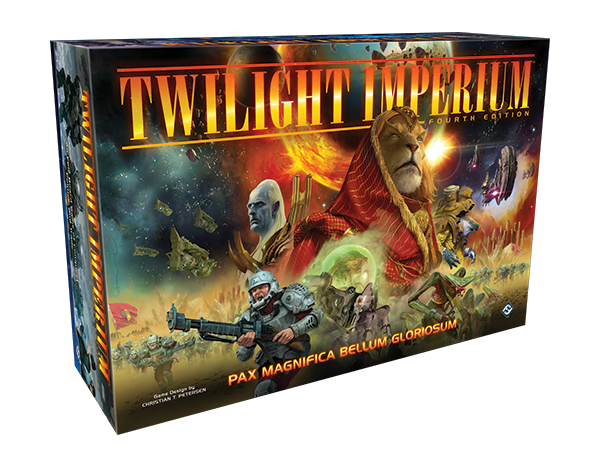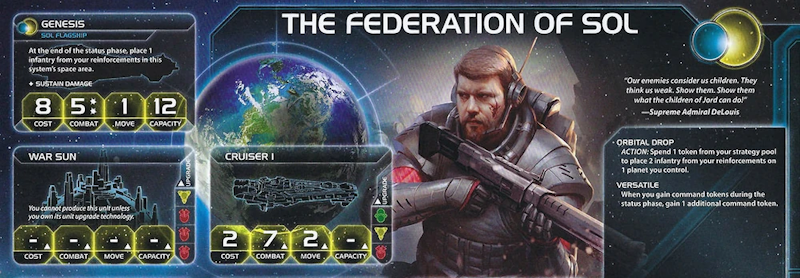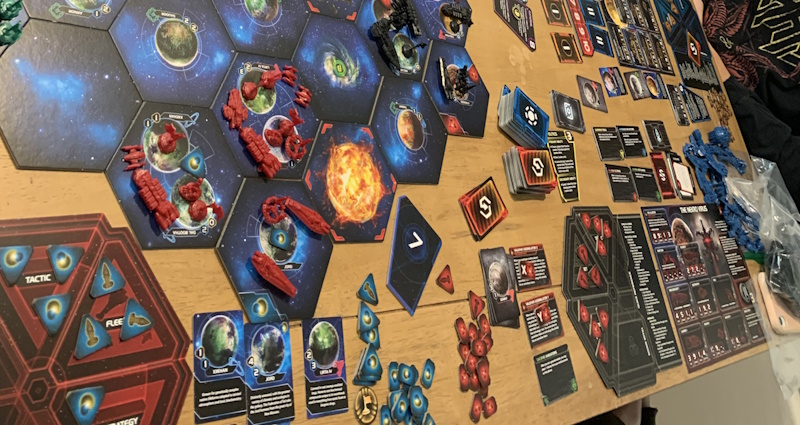Twilight Imperium
review by Sergio Almonte
The Lazax Empire lies broken. Shattered. Torn to shreds following a millennium of brutal conflict remembered only as the Twilight Wars.
But now that the lessons of the past have been wholly forgotten, scourged from the stellar weave using bullet and beam and bloody saber, Mecatol Rex, capital of the galaxy and shining gemstone in the crown of the Old Empire, lies ripe for the taking. This has not gone unnoticed by the Great Races, and once again the galaxy hovers on the brink of galactic war. Will your people rush forth and establish themselves as the new galactic superpower? Or will your empire fall by the wayside, forlorn and gutted by enemies once believed to be allies?
This is the race for supremacy.
This is the time of new beginnings.
This is Twilight Imperium.
Greetings one and all! Supreme Master and tactical genius Sergio Almonte is here to inform you of the wonders of long-form diplomacy and short term betrayals in Twilight Imperium: Fourth Edition! This review will encompass a summary of the basic mechanics of the game, alongside a personal review of the Federation of Sol and a final judgment on the strengths and weaknesses of Twilight Imperium (also known as TI4). Without further ado, let us begin!
The Contents Of The Box Relating To The Game You Are Currently Reading About
With a game that promises a full day of gaming, it is important to summarize what exactly one receives within the large box itself.
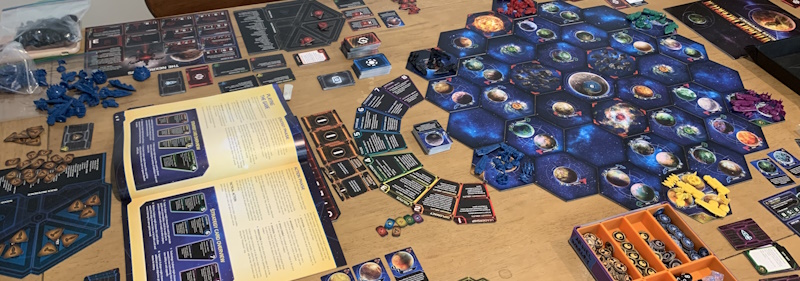 Pictured: The organized layout of a typical game of TI4. Note the individual character sheets, the communal card and token pools and the large, hex based map where all players interact with planetary bodies, spaceborne fleets and each other.
Pictured: The organized layout of a typical game of TI4. Note the individual character sheets, the communal card and token pools and the large, hex based map where all players interact with planetary bodies, spaceborne fleets and each other.
Within the large cardboard confines of Twilight Imperium, there are well over 350+ plastic miniatures used to represent the various ship types one can construct, each mini being separated into one of six player colors. Each faction in the game has a home planet, tokens, promissory notes, unique technology and action cards as well as a full page spread that outlines their abilities and what technologies have been researched by the player. There are a total of seventeen factions, leaving each playthrough vastly different thanks to the varied playstyles these factions promote.
However, it is with discussion of the contents of the box that we run into the first downside I must mention. While the box itself can easily hold the total contents provided, even after disassembly and organization of various cards and cardboard elements, there is no method to separate the factions out from one another, as the large inset divots demand that one place all factions cards in one location and all home planets in another, a poorer method of wrangling together seventeen distinct (but often very similar in color) factions and their respective contents. What can be done to alleviate this? Well, fully pre-packaged organizers do exist (and one is even available in the store, next to Twilight Imperium itself), but the method I settled upon involved seventeen ziploc bags and around ten minutes of an organizational medley. Any means to separate out the faction contents will work, but keeping these factions distinct and organized will speed up the setup process drastically.

On a positive note, the miniatures provided for the various ship classes are gorgeous, with a strong material and well designed greebling that capture the idea of a massive spaceship at scale, ala the actual miniatures used for films like Star Wars or series like Star Trek. Cast in each primary color, the miniatures are a slam dunk for making the simple act of massed fleet actions incredibly fun, as well as drawing attention from players when ships begin to move around the board and threaten their borders.
But how does one actually go about threatening the borders of an opponent, you may be asking, lovable little scamp that you are. Well, my dear reader, that brings us to the next portion of the review…
The Gameplay; Or, How I Learned to Stop Worrying and Love The Level 2 Cruiser
“Twilight Imperium is a game about politics, diplomacy, money and war.”
You may have heard this idiom before, a broad attempt to explain the focus of TI4’s mechanics on four core pillars that the gameplay is staked around. I offer up my own version.
“Twilight Imperium is a game about lying, backstabbing, money and turn order.”
To breakdown the core of TI4’s gameplay in a manner that is both digestible and can fit within an online review, I’ll summarize the steps in a typical full round of the game.
- Establishing Turn Order through Strategy Cards
- Individual Player Turns
- Scoring Public and Secret Objectives
- Agenda Phase
The bulk of the gameplay will center around the first three steps, also known as the Strategy phase, while the diplomatic and political resolutions you’ve created or broken with other players will be most important during the Agenda phase.
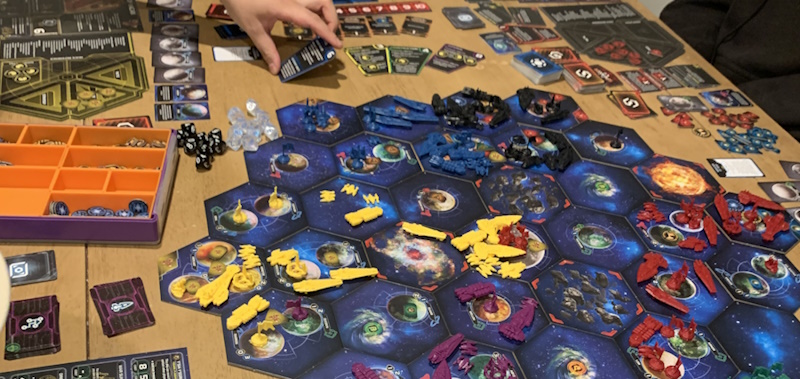 Pictured Above: A galaxy in strife. In other words, a galaxy beset by the whims of damned space cats and their endless coffers.
Pictured Above: A galaxy in strife. In other words, a galaxy beset by the whims of damned space cats and their endless coffers.
Strategy Cards determine the turn order in which players activate abilities and perform actions like moving fleets or negotiating with other players. To begin a round, the player with the talking stic- ahem, the speaker token chooses whichever strategy card they want, and this continues clockwise around the group until all players have a strategy card in hand. The number on the card determines in which order the players can activate, while the primary and secondary abilities on the card determine what major focus your empire will have for the round. Want to build up your planetary defenses or starports? Grab construction and place down one of each for free! Want to call a meeting between all players on a vital planet in your territory, denying it to any leering eyes that may wish to invade? Choose politics and aggravate tensions to your heart’s content. Since more neutral abilities come sooner in the round order, and more aggressive ones show up later, the game naturally divides players with a warmongering streak below those who are more open to shift strategies, benefiting those who can be flexible and engage with the game’s mechanics vs those who simply wish to bullrush their opponent. But if only one player per round was able to research technology or construct defensive platforms, the game would progress at such a glacial pace that one might genuinely perish of thirst or hunger before the game was up. But this is where a masterstroke of design comes in to save the day in the form of Secondary Abilities. While primary abilities can only be used by the owner of the strategy card, secondary abilities are opened to the table whenever the primary ability is activated. However, these are often at a cost of strategy tokens from your pool of command tokens, and these strategy tokens are directly competing for air with the tactic tokens used to move fleets and fleet tokens used to maintain them. So, do you focus heavily on the secondary ability of an opponent, or do you take the initiative and focus on your fleets to surprise and overtake an enemy planet? Decisions aplenty litter Twilight Imperium, and how you respond to these decisions will shape the galaxy itself.
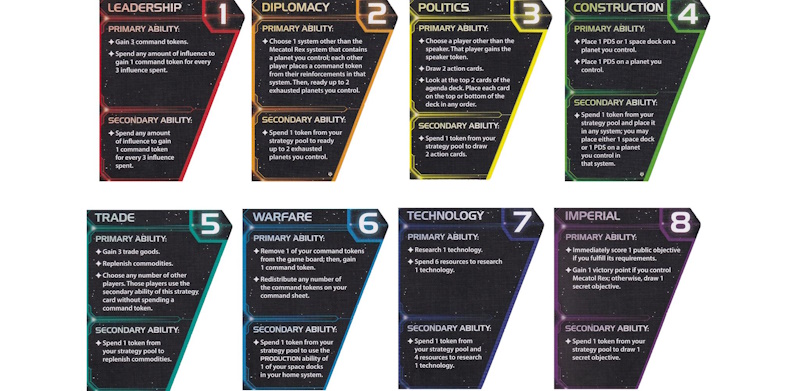
When it comes to interaction with other players, an enterprising player has several methods of approach. Of course, flexing some military muscle by placing fleets above enemy planets and forcing another player to make crucial concessions in the form of territory or diplomatic support is always an option, though often a crude and inflexible one. Fighting a war is costly, and one will quickly be isolated from potential lines of support if they constantly rustle the pot with invasions and fleet combat. Another path is through diplomacy. Crucially, one can make all the promises they wish to another player, but until an actual trade is made (requiring the players to be in adjacent hexes) the promise is null and void; nothing is lost by breaking it (other than goodwill, of course). However, each player can trade promissory notes that act as official marks of an agreement, involving actions such as a ceasefire, trade agreement and political or military support. Once these notes are traded away, the agreement becomes law, and an attempt to break them will result in consequences for the offending player and the death of any budding peace amongst the stars. Promissory notes belonging to another faction can be traded to other players however, so a particularly wily player may sell the red player’s ceasefire (at a considerable cost, no doubt) to an opponent losing a war to the red player, forcing the red player to back out of the conflict and freeing the wily player’s hands in matters of invading the red player’s territory, as long as the red player does not possess the wily player’s ceasefire as well. The back rubbing and quid pro quo agreements systematize the natural series of backstabs and negotiations that arise in any social game, allowing players to work within the mechanics rather than ignore them in favor of out-of-game agreements.
Once all strategy cards have been activated, the game moves to scoring any public or secret objectives on the board. The goal of TI4 is to gain ten victory points before your opponents do, meaning that objectives constitute your main method of gathering these victory points. Public objectives are revealed as the game goes on and can be scored by either investing resources or completing a goal (spend ten supply or own six planets for example) while secret objectives are specific to a player and can be scored once their much more specific requirements are met (such as winning a battle against the player with the most victory points). The number of victory points scored by each player is public information, meaning that pulling too far ahead can quickly put a target on your back and lead to a cavalcade of issues with other players flaring back to life. Controlling Mecatol Rex, the planet in the center of the galaxy map and the main hub of political negotiation, will also afford a player a victory point, but only so long as they continue to hold the planet. Heavy is the head that wears the crown, and Mecatol Rex is a heavy crown indeed…
Once objectives have been scored, the Agenda Phase begins. Well, it only begins if someone holds Mecatol Rex, as the ever-seductive planet constantly lures players towards it as a siren driving a boat towards the rocks. Once the capital of the galaxy has been claimed, agenda items begin being put onto the docket and voted on by players, using reputation from their captured planets to skew the vote in their favor. These agenda items can range from minor agreements being made by all parties to a single player being given an extremely powerful one-time ability, such as the ability to force peace between players and nip a conflict in the bud. Two agenda items are voted on each turn, and they add yet another inflection point for players to strategize and betray one another, as voting coalitions and quid-pro-quo agreements are made in return for political support.
“Well, all of this sounds extremely interesting” you’re no doubt saying to yourself, “but I wish it was enumerated to me how the factions are distinct from one another in the form of a pointed review of just one of the seventeen choices.” Well, my dear reader, your wish is my command…
The Federation of Sol and Its Consequences Have Been A Disaster For Everyone But The Human Race
So, the Federation of Sol…

Ahem. I apologize. The Federation of Sol…
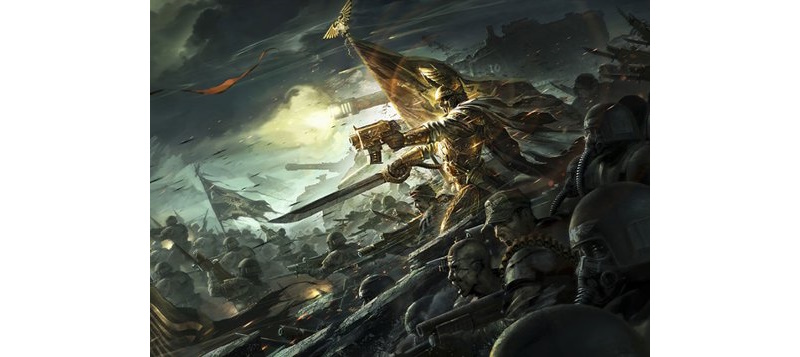
THE FEDERATION OF SOL-
There we go.
The Federation of Sol, and Humanity as a whole, are the youngest of the Great Races, those species favored by the Old Empire with voting privileges. Riding forth from the homeworld of Jord (Earth to us lowborn folk), the Federation do two things extremely well. They are more numerous than cockroaches, and are much harder to kill. On the whole, the Federation focuses on generating and transporting infantry units to control their holdings, and with their upgraded spec-ops teams, can grind opposing player’s ground forces into dust. Alongside this, they generate an extra command token to use every status phase, meaning that their fleets can be bigger and move more often than their opponents. However, this means that they rely heavily on their carriers to transport infantry from system to system, and can quickly overtax their captured planets when it comes to creating new ships and infantry. As such, they’re poised to favor a more aggressive playstyle, capturing planets and taunting opponents with fortified holdings teeming with infantry and ships. This also means that they can easily stretch themselves thin fighting an endless series of wars, and holding Mecatol Rex stretches that oversight even thinner. The youngest and boldest of the Great Races favors aggressiveness but can be caught out and destroyed by reckless conflict! A more human playstyle there is not.
This flavorful mixture of in-game mechanics and out-of-game player temperament extends to every faction, as your personal playstyle will engender you towards different factions based on their mechanics. Want to become a trade baron and fund proxy wars to distract your opponents? The Emirates of Hacan and their feline faces are right up your alley! Favor raiding your opponents and forcing them to take losing battles where they least expect it? The piratical Mentak Coalition or the ethereal Ghosts of Creuss will suit you well! Each faction is not so restrictive as to limit creative builds, but not so loose as to ignore what separates them from any other faction in the game. The sky is quite literally the limit, so get out there and find your favorite species to annoy your friends with!
The End. Or Rather, the Beginning.
So, we end up now sitting on our proverbial Mecatol Rex, contemplating whether or not TI4 will be the game for you. And, dear reader, that is a decision that will be made by yourself and yourself alone. However, what I can do is provide what I think are the main pros and cons of Twilight Imperium so that you may make a more educated decision.
PROS:
- A vibrant board and colored tokens make TI4 a visual treat
- The game mechanics allow for creative solutions to problems and systematize diplomacy
- The depth of gameplay is something few, if any games can offer, with strong focus on large scale conflict and a medley of cost-benefit abilities that will leave you biting your nails or smugly awaiting your inevitable victory
- The number and variety of factions, as well as the randomized board state, leaves room for a nearly endless amount of replay value
- Very emotionally exciting. Large scale fleet actions will feel triumphant, and defeats will be crushing. The stress of holding onto Mecatol Rex will turn a gleeful player into a spiteful, paranoid lunatic hellbent on controlling the planet to the ultimate failure of their empire. The road to Mecatol is paved in the bones of a million broken promises.
- It's just cool, man.
CONS:
- The game requires a large playspace. Studio apartments beware
- TI4 is a big timesink. As is often said in regards to the game, you don’t set aside an hour to play, you set aside a day.
- While accommodating as few as three players and as many as six, the game requires investment from its players regardless. Accommodations must be set aside for those playing to be comfortable for the duration of the game.
- The lack of a faction-centric agenda system to coordinate efforts across your empire is a notable absence for a game so focused on politics and diplomacy.
- While extremely fun, it is not a game to recommend to those who are newer to board gaming in general, even if the rules are surprisingly easy to grasp and learn.
So get out there, my kingly monarchs and incredibly immoral scientists! The galaxy is yours to claim, and Mecatol Rex lies vacant! Be the one to create peace, and then be the one to drive the knife into your allies back! No rule is sacred, except that money and power are law! Build! Destroy! Negotiate! Fulfill your dreams of becoming a soulless bureaucrat and annihilate friendships in a single game!
This is your path!
This is your dream!
This is Twilight Imperium.
Twilight Imperium is available now at our webstore.
